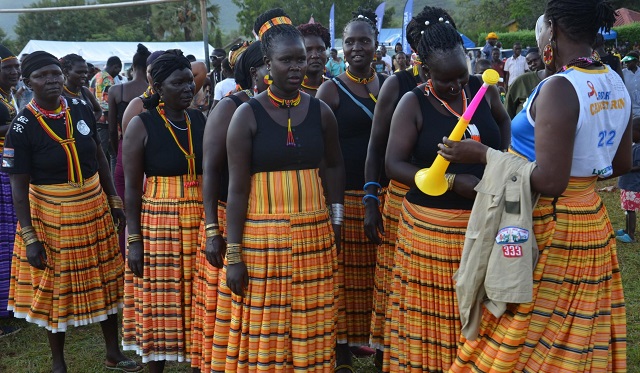
Kotido, Uganda | THE INDEPENDENT | Elders in Kotido district have called for a ban on short skirts, tight clothing and trousers among women employed in the public service. They say that the dress code is disrespectful and immoral.
John Bosco Akore, the secretary of Kotido Elders Council told URN that skirts that do not go below the knee are indecent and if not stopped, will erode cultural values among the young generation in Karamoja. He blamed the dress code on the acceptance of other tribes into the region.
Although the Karamojong walked naked in the past, they have in recent years adopted a traditional garb; an equally short outfit, which however is not tight and also not ideal for the office environment because it is designed with beads and ornament.
But Akore says that young working-class ladies have come with a new style which is considered indecent among the Karamojong.
Joyce Loyola, a resident of Panyangara sub county blamed parents for failing to ensure that their daughters dress appropriately, saying it is now common to see young girls donning seductive dresses, which exposes them to abuse by men.
Loyola said every part of a woman’s body is attractive to men and therefore it’s necessary to stop all visibility of these parts so that boys and men won’t get distracted.
“We have tried to teach our daughters to respect others and self-control. Nowadays they are taking us parents like their agemates, and some call us outdated,’’ Loyola said, and warned that dress codes must be strongly reinforced and enriched for the safety of the young generation.
However, Timothy Odelok, the programme officer at Karamoja Women Umbrella Organization (KAWUO) opposed the proposed ban saying it’s demeaning to imagine that culture still controls women’s dress codes. Odelok says the elders are still trapped in a culture where women were controlled and not allowed to participate in the decision-making, yet they have now woken up to create change in society.
He added that development partners have put in a lot of effort to ensure that there is gender equality and calling for this ban may be intended to drag them backwards. Odelok said that the excuse that the dress code endangers the young generation is far-fetched because they are supposed to proceed with an education that will expose them to new things.
He warned that banning or criticizing women’s dress codes undermined the effort they have put in as development partners to enhance gender equality and gender equity.
In 2013, a motion seeking to ban miniskirts in Uganda was fronted by the then Minister of Ethics and Integrity, Simon Lokodo. But the public expressed concern about its implications to constitutional freedoms.
*****
URN
 The Independent Uganda: You get the Truth we Pay the Price
The Independent Uganda: You get the Truth we Pay the Price





